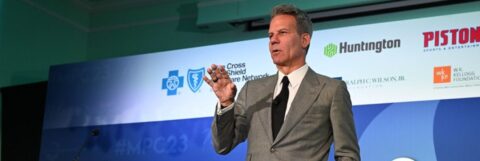- Michigan must take advantage of the opportunity to deepen its focus on economic development to retain, attract, and generate talent, according to “Michigan’s Great Inflection: A Strategy for the Age of Technology and Talent,” a new study authored by Richard Florida and Creative Class Group.
- Placemaking in Michigan is ripe for success due to the extreme uniqueness and diversity of cities, which makes the state so distinct compared to every other state.
- Collective partnership focused on alignment between education and business is a necessity to advance economic development, along with simultaneous placemaking.
A Conversation with Richard Florida and Anika Goss on How Michigan Can Harness the Power of Knowledge Transformation
May 31, 2023
Key Takeaways
The world’s leading urbanist, Richard Florida, opened the session with a high-level debrief of the newly released report “Michigan’s Great Inflection: A Strategy for the Age of Technology and Talent,” authored by Florida and the Creative Class Group, and its significant findings which have the potential to revolutionize communities and the state.
This report created three pillars to organize the work to best position Michigan in a space to respond rapidly and effectively to the needs of the workforce, according to Florida.
“Focus on transformational technology, focus on talent, and keep those great computer scientists and software engineers and attract them, and we have a third one – placemaking,” he said.
Florida went on to explain how placemaking has a key role in transforming and advancing the auto industry in Michigan. Referencing the well-known and studied book of General Motors by Peter Drucker, The Concept of the Corporation, Florida also expanded on Drucker’s 1946 observation of the company that it was knowledge, not physical labor, that was the basic factor of automotive production, which is evident in today’s automotive production trends.
The Kresge Foundation’s Rip Rapson and Detroit Future City’s Anika Goss then joined Florida on stage for an engaging conversation on how cities like Detroit must position themselves to seize the moment to shift economies to the technological and knowledge-based work of the future, with a deep and intentional focus on inclusion.
Calling for a deep focus on equity that leads to an inclusive economic strategy regardless of geography and ethnicity, Goss referenced the research of Detroit Future City.
“In Detroit Future City research, at all levels, at all education levels, and all growth occupation levels, discriminatory practices still exist,” Goss stated.
Additionally, the report and conversation focused on the need for academic alignment, both between community colleges and universities, but also between higher education and industry, including growing a college town.
“You have to think of it as a system that aligns to work better – education, government, business,” Florida stated.
Digger deeper into the opportunities specific to Michigan, Rapson pressed on how the governor can best move using the report and its recommendations. In return, Florida shared the recommendations for the creation of a broad-based group to guide this work and work to align education and industry.
This Mackinac Policy Conference session was hosted by The Kresge Foundation.
